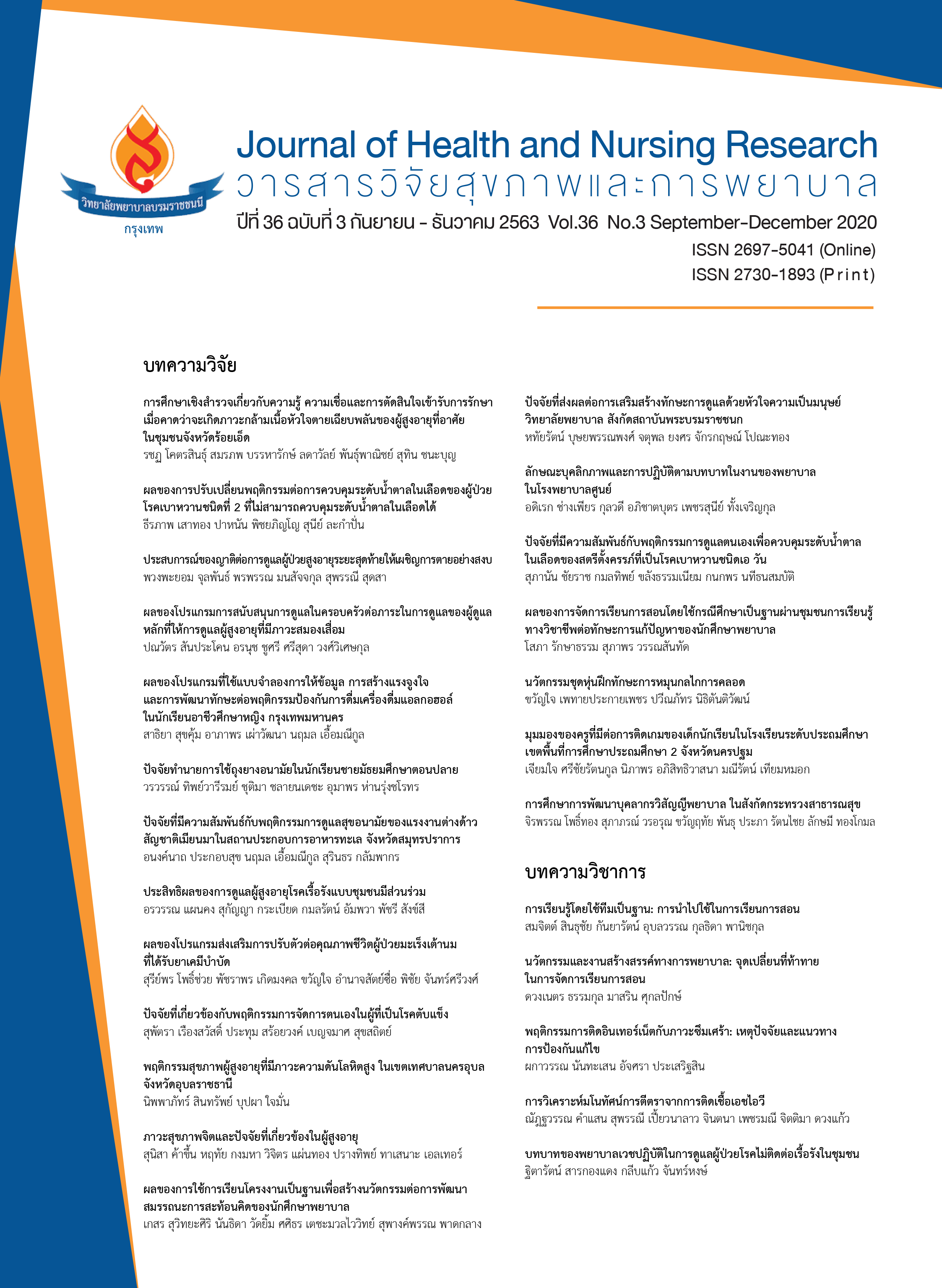ปัจจัยที่เกี่ยวข้องกับพฤติกรรมการจัดการตนเองในผู้ที่เป็นโรคตับแข็ง
คำสำคัญ:
พฤติกรรมการจัดการตนเอง, ความรู้เกี่ยวกับโรคและการรักษา, ความวิตกกังวล, การสนับสนุนทางสังคม, ผู้ที่เป็นโรคตับแข็งบทคัดย่อ
ผู้ที่เป็นโรคตับแข็ง หากมีการปฏิบัติพฤติกรรมการจัดการตนเองอย่างถูกต้องและสม่ำเสมอจะช่วยชะลอการเกิดภาวะแทรกซ้อนของโรค รวมทั้งลดความรุนแรงและอัตราการกลับมารักษาซ้ำในโรงพยาบาล การวิจัยเชิงพรรณนาหาความสัมพันธ์นี้ มีวัตถุประสงค์เพื่อศึกษาพฤติกรรมการจัดการตนเองและปัจจัยที่เกี่ยวข้องกับพฤติกรรมการจัดการตนเองในผู้ที่เป็นโรคตับแข็ง กลุ่มตัวอย่างคัดเลือกอย่างเจาะจง คือ ผู้ที่เป็นโรคตับแข็งจำนวน 85 ราย ที่มารับการรักษา ณ คลินิกโรคระบบทางเดินอาหาร โรงพยาบาลมหาวิทยาลัย เครื่องมือที่ใช้ในการวิจัย ได้แก่ แบบบันทึกข้อมูลส่วนบุคคล แบบประเมินพฤติกรรมการจัดการตนเองผู้วิจัยดัดแปลงจากแบบประเมิน Self-management Behaviour Scale for Liver Cirrhosis ที่พัฒนาขึ้นโดย Wang และคณะ ตามกรอบแนวคิดของ Lorig และ Holman แบบประเมินความรู้เกี่ยวกับโรคและการรักษาผู้วิจัยพัฒนาขึ้นจากการทบทวนวรรณกรรม แบบประเมิน State-Trait Anxiety Inventory Form Y (STAI form Y) พัฒนาโดย Spielberger และคณะ และแบบประเมินการสนับสนุนทางสังคมพัฒนาโดย Schaefer และคณะ มีค่าความเชื่อมั่นเท่ากับ .73 .72 .96 และ .86 ตามลำดับ การวิจัยนี้ผ่านการพิจารณาจากคณะกรรมการจริยธรรมการวิจัย กลุ่มตัวอย่างเข้าร่วมวิจัยด้วยความสมัครใจ รวบรวมข้อมูลโดยตอบแบบสอบถามด้วยตนเอง วิเคราะห์ข้อมูลโดยใช้สถิติเชิงพรรณนาและสัมประสิทธิ์สหสัมพันธ์แบบสเปียร์แมน
ผลการวิจัยพบว่า กลุ่มตัวอย่างมีพฤติกรรมการจัดการตนเองโดยรวมอยู่ในระดับไม่ดี (ร้อยละ 82.35) ความรู้เกี่ยวกับโรคและการรักษาไม่มีความสัมพันธ์กับพฤติกรรมการจัดการตนเองโดยรวม ความวิตกกังวลมี
ความสัมพันธ์ทางลบในระดับต่ำ (rs = -.26, p<.05) กับพฤติกรรมการจัดการตนเองโดยรวมและการสนับสนุนทางสังคมมีความสัมพันธ์ทางบวกในระดับต่ำ (rs = .28, p<.01) กับพฤติกรรมการจัดการตนเองโดยรวมอย่างมีนัยสำคัญทางสถิติในผู้ที่เป็นโรคตับแข็ง
ผลการวิจัยนี้แสดงให้เห็นว่า การส่งเสริมพฤติกรรมการจัดการตนเองโดยวิธีการให้ความรู้ ลดความกังวลเกี่ยวกับการเจ็บป่วยและได้รับการสนับสนุนจากบุคคลอื่นอาจไม่เพียงพอ ดังนั้น พยาบาลและบุคลากรควรศึกษาปัจจัยอื่นที่อาจเกี่ยวข้องกับพฤติกรรมการจัดการตนเอง เพื่อช่วยให้ผู้ที่เป็นโรคตับแข็งสามารถปฏิบัติพฤติกรรมการจัดการตนเองได้อย่างเหมาะสม
Downloads
เอกสารอ้างอิง
2. Strategy and Planning Division, Ministry of Public Health (Thailand). Statistical Thailand. 2018. Nonthanuri: Strategy and Planning Division, Ministry of Public Health (Thailand).
3. Polis S, Fernandez R. Impact of physical and psychological factors on health-related quality of life in adult patients with liver cirrhosis: a systemic review protocol. JBI Database of Systematic Reviews Implementation Reports 2015;13(1):39-51.
4. Fagerstrom C, Frisman GH. Living with liver cirrhosis: a vulnerable life. Gastroenterology Nursing 2017;40(1):38-46.
5. Shabanloei R, Ebrahimi H, Ahmadi F, Mohammadi E, Dolatkhah R. Stigma in cirrhotic patients: a qualitative study. Gastroenterology Nursing 2016;39(3):216-26.
6. Sari AA, Karyani AK, Alavian SM, Arab M, Gholmohamadi FR, Rezaei S. The economic burden of liver cirrhosis in Iran: cost of illness study. Iranian Journal of Public Health 2015;44(4):512-21.
7. Volk ML. Hospital readmission of patients with cirrhosis: A canary in a coal mine. Clinical Gastroenterology and Hepatology 2016;14(5):760-1.
8. Lorig KR, Holman HR. Self-management education: History, definition, outcome, and mechanisms. The Society of Behavioral Medicine 2003;26(1):1-7.
9. Dong N, Chen WT, Bao M, Qian Y, Lu H. Self-management behaviors among patients with liver cirrhosis in Shianghai, China: a cross-sectional study. Clinical Nursing Research 2018; 1-25.
10. Hayward KL, Valery PC, Cottrell WN, Irvine KM, Horsfall LU, Tallis CJ, et al. Prevalence of medication discrepancies in patients with cirrhosis: a pilot study. BioMed Central Gastroenterology 2016;16(114):1-9.
11. Lin WJ, Huang HM, Lee, BO, Sun FK. The relationships between uncertainty and coping behaviors of patients with liver cirrhosis. International Journal of Nursing & Clinical Practices 2017;4:1-7.
12. Jansrithong P. Factors predicting self management in older persons with acute coronary syndrome in tertiary hospitals [master’s thesis]. Bangkok: Chulalongkorn University; 2016. (in Thai).
13. Aramsin R, Kerdkul P, Jarujit S, Prachanno W. Self-management behaviors among patients with hypertension in Mueang District, Chonburi Province. Journal of Phrapokklao Nursing College 2018;29(1):68-77. (in Thai).
14. Jandeekaewsakul P, Watthayu N, Suwonnaroop N. Factors predicting self-management behavior among patients with uncontrolled essential hypertension. Journal of Nursing Science 2018;36(1): 31-43. (in Thai).
15. Bai YL, Chiou CP, Chang YY. Self-care behavior and related factors in older people with type 2 diabetes. Journal of Clinical Nursing 2009;18(23):3308-15.
16. Huang M, Zhao R, Li S, Jiang X. Self-management behavior in patients with type 2 diabetes: a cross-sectional survey in western urban China. Public Library of Science ONE 2014;9(4):1-7.
17. Troung PV, Jullamate P, Piphatvanitcha N. Factor related to self-management behaviours in hypertensive older adults in Haiduong Province, Vietnam. Journal of Nursing and Health Sciences 2016;10(3):56-64.
18. Li H, Jiang YF, Lin CC. Factors associated with self-management by people undergoing hemodialysis: A descriptive study. International Journal of Nursing Studies 2014;51(2):208-16.
19. Cohen J. Statistic power analysis. Psychological Bulletin 1992;122(1):33-2909.
20. Polit DF. Statistic and data analysis for nursing research. Canada: Pearson. 2010.
21. Pfeiffer E. A short portable mental status questionnaire for the assessment of organic brain deficit in elderly patients. Journal of the American Geriatrics Society 1975;23:433-41.
22. Intarasombat P. Health assessment for the elderly. Ramathibodi Nursing Journal 1996;2(3):44-56. (in Thai).
23. Wang Q, Wang Y, Gao J, Han JT, Li YP. Development of self-management behavior scale for liver cirrhosis. International Journal of Nursing Sciences 2015;2(1):73-9.
24. Spielberger CD, Gorsuch RL, Lushene R, Vagg P, Jacobs GA. Manual for the stat-trait anxiety inventory STAI (From Y), self-evaluation questionnaire. Palo alto, CA: consulting Psychologist Press; 1983.
25. Thapinta D. Reduction of anxiety of staff nurses working with aids patient through cognitive reconstructuring and mindfulness training [doctoral’s thesis]. Bangkok: Chulalongkorn University;1992. (in Thai).
26. Schaefer C, Coyne JC, Lazarus RS. The health-related function of social support. Journal of Behavioral Medicine 1981;4(4):381-406.
27. Hanuchcharurnkul S. Social support, self-care, and quality of life in cancer patients receiving radiotherapy in Thailand [doctoral’s thesis]. Detroit, MI: Wayne State University; 1988.
28. Hornung-Praehauser V, Ploessnig M, Zauchner-Studnicka S, Kautzky-Willer A, Leuther M. Better insight into gender-specific diabetes self-management for more effective diabetes services. European Journal of Public Health 2016;26(1):378-9.
29. Phua SH, Taha NA, Pau KB, Kong WY. Evaluation of self-management behavior of chronic kidney disease patients. Journal of Pharmacy and Pharmacology 2017;5:179-188.
30. Park SK. Factors affecting self-care behavior in Koreans with COPD. Applied Nursing Research 2017;38:29-37.
31. Popovic DD, Culafic DM, Tepaccevic DBK, Kovacevic NV, Spuran MM, Djuranovic SP, et al. Assessment
of depression and anxiety in patients with chronic liver disease. Vojnosanitetski Pregled 2015;72(5):414-20.
32. Bettoni LC, Ottaviani AC, Orlandi FS. Relationship between self-care and depression and anxiety symptoms in individuals undergoing hemodialysis. Northeast Network Nursing Journal 2017;18(2);181-6.
33. Kitreerawutiwong K, Kingnetr G, Saengpak C, Wongsawang N. Factor influencing diabetes self-management behavior among type 2 diabetes mellitus patients. Journal of The Royal Thai Army Nurses 2017;18(3):192-200. (in Thai).
ดาวน์โหลด
เผยแพร่แล้ว
รูปแบบการอ้างอิง
ฉบับ
ประเภทบทความ
สัญญาอนุญาต
บทความที่ได้รับการตีพิมพ์ เป็นลิขสิทธิ์ของวารสารวิจัยสุขภาพและการพยาบาล (วิทยาลัยพยาบาลบรมราชชนนี กรุงเทพ) ไม่สามารถนำไปตีพิมพ์ซ้ำในวารสารฉบับอื่น


















